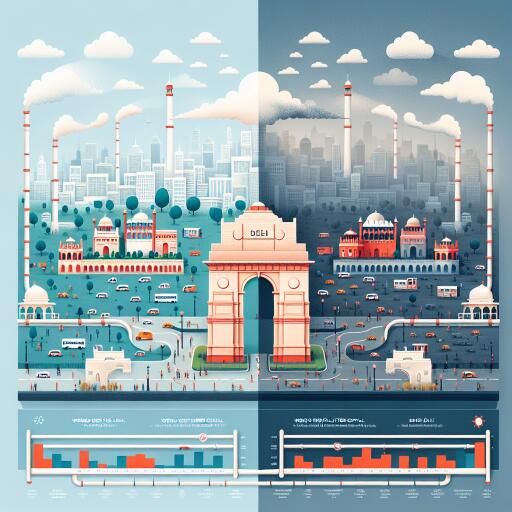
Report Reveals Delhi Retains Title as World’s Most Polluted Capital
Surpassing previous records, Delhi has once again been identified as the capital city with the world’s most compromised air quality. This discovery comes from a recent environmental report which showcases unsettling global pollution statistics, including the revelation that Bihar’s Begusarai now stands as the most polluted urban area on the planet. The 2023 World Air Quality Report, compiled by Swiss-based organization IQAir, indicates a sharp decline in the air quality across numerous regions, placing India alarmingly high on the list of countries with poor air standards.
India currently ranks as the third most polluted country, trailing behind Bangladesh and Pakistan, with an average particulate matter (PM2.5) concentration of 54.4 micrograms per cubic meter. This marks a significant downturn from its eighth-place ranking in 2022. The surge in detrimental air quality levels, especially noted in Begusarai, which reported an average PM2.5 concentration of 118.9 micrograms per cubic meter, underscores a critical environmental crisis. This figure dramatically contrasts its previous non-ranking, emphasizing the urgency for actionable solutions.
Delhi’s predicament worsened, with PM2.5 levels ascending from an average of 89.1 to 92.7 micrograms per cubic meter from 2022 to 2023. This unfortunate trend confirms Delhi’s unwelcome distinction as the most polluted capital worldwide for the fourth straight year. It is a distressing reality that approximately 1.36 billion individuals in India are exposed to levels of PM2.5 that surpass the World Health Organization’s (WHO) recommended guideline of 5 micrograms per cubic meter annually.
The data paints a grim picture, revealing that nearly 96 percent of India’s populace is subjected to PM2.5 concentrations that exceed WHO’s guidelines by more than sevenfold. This alarming statistic is further illustrated by the fact that two-thirds of Indian cities have reported annual PM2.5 averages above 35 micrograms per cubic meter. Notably, the information collated for the report was derived from an extensive global network, including over 30,000 air quality monitoring stations managed by a diverse array of entities such as governmental bodies, research institutions, and citizen scientists.
The expansion of the report’s scope to include 7,812 locations across 134 countries underscores the growing concern regarding air pollution — a leading environmental threat to human health. Causally linked to an estimated one in nine deaths globally, air pollution, according to WHO, is responsible for around seven million premature deaths annually. Its far-reaching impact extends beyond immediate health repercussions, affecting cognitive development in children, mental health, and aggravating chronic conditions like asthma, cancer, stroke, lung disease, and diabetes.
The stark reality of escalating air pollution levels calls for immediate and concerted efforts to mitigate this global health crisis. It underscores the importance of sustainable practices and policies aimed at curbing emissions and safeguarding the environment for future generations.





Leave a Reply